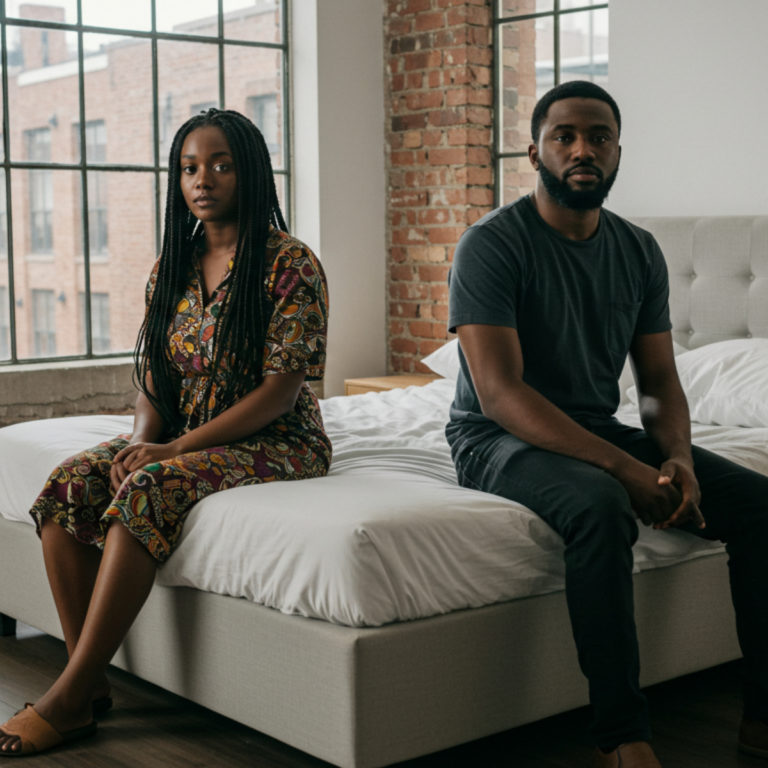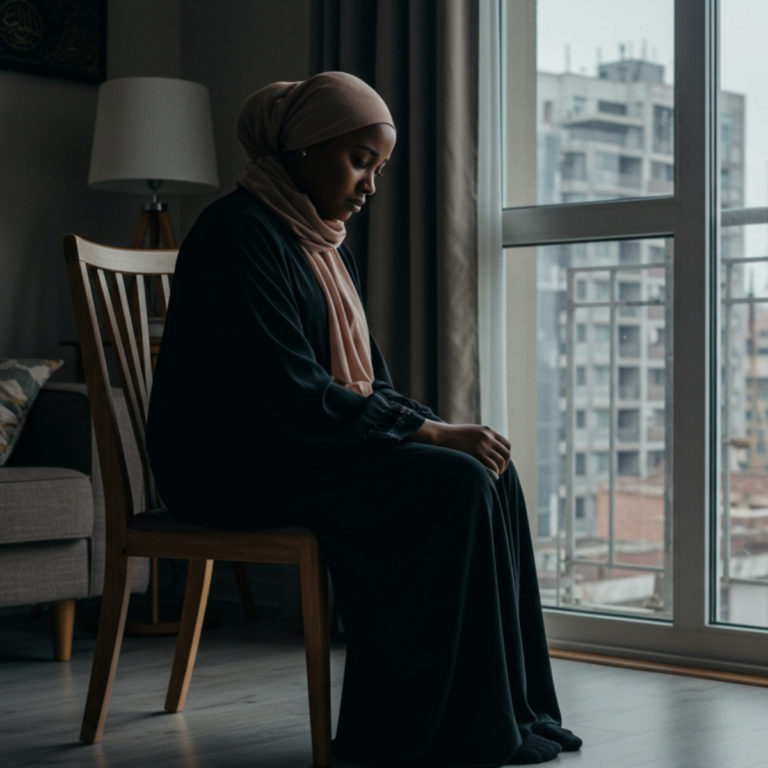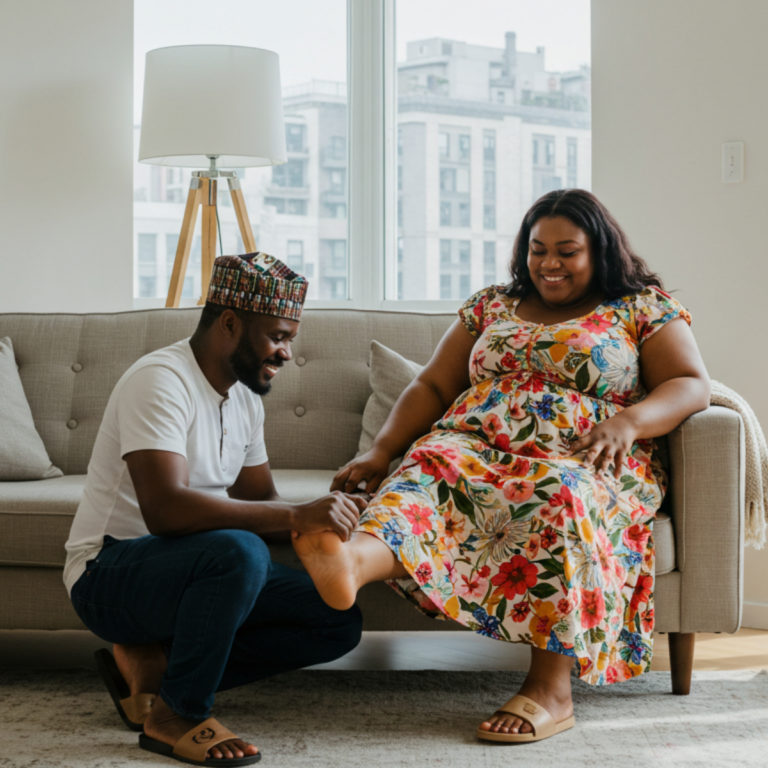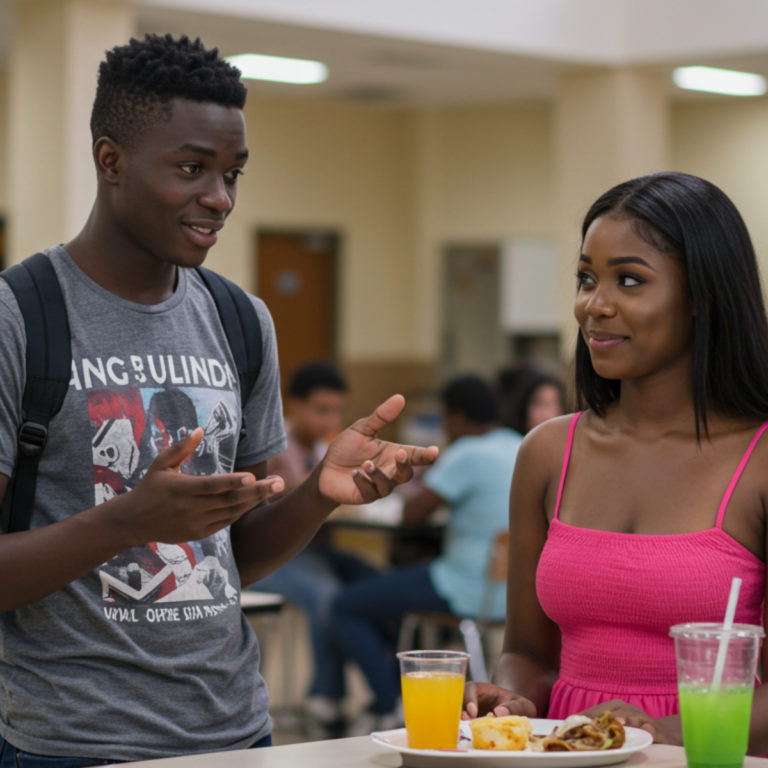Love Life is a Zikoko weekly series about love, relationships, situationships, entanglements and everything in between.

Trade on Yellow Card and win tickets to see Gladiator 2! Trade $10+ for a chance to win Filmhouse tickets or go big and trade $1,000+ to win Cube tickets.
Enjoy low fees, great rates, and top security. Join Yellow Card today!

What’s your earliest memory of each other?
Motunde: It was at a cemetery in 2018. I had just returned from Benin Republic and wanted to visit my dad’s grave for the first time three months after his passing. I was completely lost, wandering around for what felt like hours. Then, this guy showed up and offered to help. Initially, I was startled because I was so lost in my thoughts that I didn’t even know when he approached me. I didn’t answer him sha. I just nodded and kept walking.
Why?
Motunde: I guess you could say I’d watched enough Nollywood movies to know better than to speak to a stranger in the cemetery. He could have been a ghost or something.
Anyway, his phone rang around the same time and from his conversation, I felt slightly relieved. I think it was a relative who called because there was a lot of praying, and he kept saying “amen”. He asked to help me again after he got off the phone, and this time around, I responded.
Gregory: The funny thing is, I wasn’t even supposed to be there that day. I’d kept postponing the visit to my dad’s grave because work wouldn’t allow and I wasn’t keen on visiting alone. My siblings were also supposed to come because we wanted to lay wreaths on the grave and inspect some minor construction work, but they cancelled at the last minute.
When I noticed Motunde, she looked so frustrated, pacing back and forth. Something told me to ask if she was okay, and she said she was trying to find her dad’s grave. I’d been in a similar mix the first time I came to the cemetery, so I knew what she was dealing with and decided to help.
How were you able to locate a stranger’s grave?
Gregory: Well, there’s a way they demarcate the cemetery. The first question I asked was if her dad was Christian or Muslim. He was Muslim, so that gave me an idea of where to look.
Right
Motunde: He helped me find the grave and stayed with me the entire time, even though I was crying my eyes out.
Gregory: I couldn’t leave. I’d been there before—feeling lost and overwhelmed by grief—and I wanted to make it easier for her. Before leaving, I jokingly said, “If you owe me anything, it’s lunch.”
Motunde: I thought, “Who asks for lunch in a cemetery?” But he said it so casually that I laughed. He also asked for my phone number under the guise of “checking in”, and I gave it to him because he’d been so helpful that I didn’t feel the need to deny his request. Plus, I wasn’t planning to stay in touch.
You weren’t?
Motunde: The cemetery didn’t seem like an ideal place for a love story to happen.
I see. So what happened after that?
Motunde: Nothing, really. A week after the cemetery encounter, he texted me to check up, but I wasn’t really interested, so the communication fizzled out. Then, eight months later, I ran into him at a party in Osun state.
Gregory: It was a complete coincidence. I saw her across the room and thought, “No way. What are the chances?” I walked up to her and said, “Do you always meet people in strange places?” She laughed and tried to form brand new, as if she didn’t know who I was, but I wasn’t having it. We talked all night.
Motunde: We went on and on about how cool and peaceful Osogbo was. We also veered into bits of our personal life, work and other stuff. Our conversation that night made me realise there was more to him than I thought. He wasn’t just the kind man from the cemetery—he was funny, attentive, and easy to talk to.
Gregory: After that night, we started texting and talking more regularly. At first, it was casual, but over time, our conversations deepened.
How so?
Gregory: We got into more personal aspects of our life. I’d been single for so long because I was hyper-focused on my business and money, but I’d started to feel strong waves of loneliness since I lost my mum. Motunde was the first person I shared this with because my siblings and other relatives would have assumed I was depressed or something if I mentioned loneliness. I didn’t want that.
Motunde: Like I said, Greg’s very easy to talk to. I found myself talking about some of my projects, family troubles I was navigating, and just personal things you’d only share with people you’ve known for a long time.
Was this how you became friends?
Gregory: In a way. We talked for hours about anything and everything, and she quickly became one of my favourite people.
Motunde: He was consistent, which meant a lot to me. He paid attention to the little things—like when I mentioned missing amala from a restaurant in Lagos, and he sent me a picture of himself eating there a week later, teasing me about it.
Gregory: I wasn’t teasing — I was trying to make her smile.
Motunde: Those moments made me feel seen. He wasn’t just my friend; he became someone I trusted deeply.
Gregory: I think that’s what made transitioning to dating so easy. The foundation was already there.
I was coming to that. How did the relationship move from friendship to dating?
Motunde: It all felt very natural. There wasn’t a grand confession of love or anything like that. In March 2019, he told me how he felt, and I realised I felt the same way. I remember the month because I wrote about it in my journal and prayed to God about what I was about to get myself into.
Gregory: I didn’t want to risk ruining what we had, but I also didn’t want to hold back my feelings. I told her, “If you don’t feel the same, we can stay friends—no pressure.”
Motunde: I appreciated that he made it so easy to say yes. It didn’t feel scary or rushed; it felt right. And that was how we became official.
Cute. What were those early days of dating like?
Motunde: Oh, they weren’t my favourite days. We went from seeing each other almost all the time to going weeks and months apart. Work took me to Abuja shortly after we started dating, so we became a long-distance couple. Greg was in Lagos.
Gregory: Those days tested our communication skills. Since we couldn’t rely on physical presence, we had to be intentional about staying connected via phone calls and constant texting, and I struggled with that.
There were days I worked long and exhausting hours and wasn’t in the mood to text or talk for long. But Motunde felt I wasn’t prioritising her.
Motunde: Sometimes, I’d text him about something important, and he’d take hours to reply because he was busy. I’d get upset, thinking he didn’t prioritise me, but when we talked about it, I realised he was trying his best to juggle work and our relationship.
Gregory: Something I took away from that period was learning to resolve conflicts without escalating them. The distance also made the times we spent together even more special.
How so?
Motunde: We typically spent only two days together whenever he visited Abuja or when I was in Lagos. So, we made sure every second counted. We locked ourselves off from the world—phones were off, we hardly stepped out—just the two of us having loads of intimate time together.
Then, in October 2019, I had a pregnancy scare.
Did this affect your relationship?
Motunde: Quite the opposite. We often talked about our future as a couple, and I was even planning to get transferred back to Lagos. Still, I wasn’t sure how Greg would take the news. I called him on the phone that day, explained the situation and said I’d go in for a proper blood test if my period was still late. Then, he asked if it was time to take the next step.
Gregory: I told her, “I know I want to spend the rest of my life with you and if this test comes out positive, I think we should get married.”
Motunde: I remember laughing so hard on the phone because I wasn’t thinking about marriage when I woke up that morning.
Anyway, I told him to let me get the test results before we started building castles in the air. The test came out negative, but Greg was still bent on his request for marriage. I came to Lagos in December 2019, and that was when he proposed.
Gregory: We had our introduction and court wedding in January, and we were going to have our traditional wedding in March. But the pandemic happened, and everything shut down.
I remember
Motunde: It was devastating. I’m my mum’s only surviving daughter — we lost my sister to a car accident in 2009 — and she’d dreamt of my wedding for years.
We didn’t immediately pause the wedding planning because we noticed some events still continued into March despite the growing coronavirus concerns. A postponement didn’t seem necessary—we’d spent so much already: printed invitations, paid ₦3m for the hall, and already bought asoebi for family and friends.
But two weeks before the wedding, government officials began clamping down on event centres, and it hit us—the wedding wasn’t going to happen.
Gregory: It was tough watching Motunde go through that. It was a shared event for both of us, but I also knew how much the ceremony meant to her and her family.
We thought we could reschedule by a week or two, but as time passed, it became clear that wouldn’t happen. My main focus was on recouping our losses. I started reaching out to vendors for refunds, which was one tough battle that rubbed salt on the injury.
Let me guess: no refunds?
Gregory: They weren’t even picking up calls, and movement was restricted, so tracking them down wasn’t as easy. The ones who picked up argued they couldn’t give a full refund. The hall, for instance, said they could only do a 50% refund. Hotels refused to refund and said we should come and use the time we paid for. Everything seemed like it was working against us, and on top of that, I had to deal with Motunde’s mum.
What was the issue with her mum?
Motunde: My mum is traditional to her core. For her, the wedding wasn’t just about me and Greg —it was also about her. My wedding was supposed to be a thanksgiving for her, almost like she shamed the devil and her enemies.
My mum wanted the whole community to see her only surviving daughter walk down the aisle in full Yoruba splendour. She’d done the same for many friends and relatives, and it was only right they also celebrated with her. The outfits, the mother/daughter dance, the spraying—it was her chance to host and show her daughter off, and she felt we deprived her of that.
It sounds like a lot of expectations to put on you. Does she understand that the cancellation wasn’t your fault?
Gregory: She does, but she hasn’t forgiven us for not rescheduling the wedding. It comes out in little ways. For example, whenever we visit, she makes these sly comments like, “When people say they’ve married off their daughters, what do they mean? Is it just going to court and signing papers?” I know it’s a sore spot for her. Sometimes, I feel like I failed to give her what she wanted.
Motunde: Or when we’re sitting with her friends at a gathering, and they ask, “How was the wedding?” She’ll answer, “Oh, there was no real wedding. It was just in court—simple.” She’ll smile, but you can feel the sting behind her words.
How does that make you feel?
Motunde: It’s frustrating. I understand where she’s coming from, but it feels like she’s holding me responsible for something beyond my control. I’ve tried explaining that it wasn’t just about the lockdown but also our current financial situation, but she doesn’t want to hear it. For her, it’s simple: the wedding hasn’t happened yet, and that’s unacceptable.
Curious. Has this caused friction in your marriage?
Motunde: Absolutely. It’s been a constant source of tension. Sometimes, I feel like Greg doesn’t understand just how much this means to me and my family.
Gregory: It’s not that I don’t understand—I do. I know how important it is to them. But I can’t ignore the financial realities we’re facing. It’s frustrating to feel like no matter how much I explain, they still hold the lack of a big wedding against me.
Motunde: I know he’s under a lot of pressure, and I try to be patient, but sometimes I feel like he could try harder. For example, I proposed doing something small for our fifth anniversary next year. I thought it could be a compromise—nothing too elaborate, just a modest ceremony with close family. But Greg didn’t seem open to it.
Gregory: It wasn’t that I didn’t want to make it happen—I even considered it seriously. But when I crunched the numbers, it just didn’t make sense. My business has been struggling for a while now, and the economy hasn’t made it any easier. I couldn’t justify spending money on a ceremony when we have other priorities.
Motunde: That conversation turned into a huge argument. I visited my mum one time, and she talked about the wedding again. I told Greg, “We need to figure this out.” He said, “Do you think I don’t want to make it happen?” And I responded, “It doesn’t feel like it.” That set him off.
Gregory: I felt attacked, honestly. I’ve been doing my best to manage our finances and keep things stable, but the pressure from her mum has trickled down to her, and it feels like it’s all falling on my shoulders.
How did you eventually resolve it?
Motunde: After a few days, I wrote him a letter explaining how deeply this wedding meant. I told him it’s not just about the ceremony—it’s about my mum and what it represents for her.
She’s traditional, and not having a wedding for her only daughter feels like she has failed at something. Although, to be fair, I hadn’t been as understanding about his financial situation as I could’ve been. I knew his business was struggling, but in my frustration, I acted like he wasn’t trying, which wasn’t true.
Gregory: After I read the letter, we sat down and talked properly. I explained that the wedding isn’t off the table—we’re just postponing it until we’re in a better financial place. I also shared how much the pressure affected me and made me feel inadequate.
What does your family think about the situation, Gregory?
Gregory: My family is more laid-back about it. They’ve always been practical people and see the court wedding as enough. To them, a big ceremony is unnecessary, especially in this economy.
How has this experience shaped the way you navigate conflict in your union?
Motunde: We’ve had to learn how to communicate better and constantly remind ourselves that our goals as a family take priority over whatever anyone wants for us.
Gregory: We also try to find compromises. An example is how we’ve talked about having a small ceremony instead of a big wedding to give her family closure. It’s not ideal, but it’s a step in the right direction. I’ve also learnt to manage expectations. Marriage comes with a lot of pressure from both sides, and it’s important to balance what works for us.
On a scale of 1-10, how would you rate your love life?
Gregory: I’d rate it a 7. Our relationship is strong because of the foundation of friendship we built early on. Still, we’ve faced our fair share of challenges, especially with the cancelled wedding and navigating expectations from her family. It’s not perfect, but we’re constantly learning and growing together.
Motunde: I’d say a 7 too. We’re committed to making this work, and even though there’s tension sometimes, I know Greg has my back. We’re working on better communication and balancing our priorities, which makes me hopeful for the future.
If you want to share your own Love Life story, fill out this form.




